Video
Summary/Key Takeaways
Dr. Adita Karkera's career journey: From studying commerce in India to becoming the Chief Data Officer for Deloitte Consulting's Government and Public Service, Dr. Karkera's path highlights the importance of curiosity, continuous learning, and seizing opportunities.
The Evolution of the CDO Role: The role of the Chief Data Officer (CDO) has evolved significantly, with a growing emphasis on AI and data governance. The CDO's responsibilities are expanding to include ensuring data quality, ethical AI implementation, and fostering a data-driven culture.
Challenges Faced by Data Leaders: Data leaders, including CDOs, face challenges such as a lack of role clarity, the need to build a strong data culture, and the integration of legacy systems with emerging technologies.
The Importance of Data and AI Literacy: Upskilling the workforce through data and AI literacy programs is crucial for organizations to effectively leverage these technologies. These programs should be tailored to the needs of different personas within the organization.
The Future of Data Leadership: The role of data leaders, particularly CDOs, is expected to become increasingly influential and powerful in the coming years. As data and AI become more central to organizational success, the demand for skilled data professionals will continue to rise.
Full Transcript
Piyush: [00:00:00] Digital agenda is all about data analytics cloud. AML and emerging technologies that are transforming not only companies but also entire industries and even our life. Hi, my name is Piyush Malik, a curious mind who wears and juggles multiple hats as an engineer, management consultant, practitioner, a builder, a thought leader, entrepreneur, and a C suite executive.
Today, my guest is Dr. Adita Karkera. Who serves as Chief Data Officer for Deloitte Consulting's Government and Public Service, where she leads the data strategy to foster value creation from the organization's data while facilitating trust. [00:01:00] With more than 22 years of industry experience, Dr. Karkera is an award winning executive dedicated to improving public service.
She's appeared on global data power women's list three times since 2022. She's also been recognized as one of 30 outstanding global women in data in 2023 and so many more awards. But now I should be addressing you as Dr. Adita, isn't it?
Adita: Thanks for that, Piyush. It's great to talk to you again today and that is absolutely right.
Piyush: Wonderful. You and I know each other from the data circuit and data leadership conferences and so on and so forth, but for the audience who don't know you, would you mind introducing yourself a little bit?
Adita: Absolutely!
Piyush:Where were you born and where did you grow up and how did you land up in the US
Adita: Yeah, happy to be useful. First, it's great to be here on the talk here with you. And yeah, I grew up in India and born and [00:02:00] raised there and got a inclination to continue to study computer science. Which, frankly, I wasn't sure that is what I wanted to do at first, so I went to college to do a degree in commerce because I wanted to grow up and be a businesswoman, much like my father, and had no idea that really I would be ending anywhere close to data or technology or I.T.
But there was a part of me that was really curious about technology and computer science. And so while I did my degree in commerce, I continued to pursue certifications on the side that helped me learn more and more about information technology and continue to spark that interest in me to continue to do that.
Studies on the side, I started to volunteer so I could have access to a computer that I could continue to play with. So I did a lot of volunteer work just to have access to that technology. And then continued on that journey until I had an opportunity to move to the United States.
[00:03:00] Where I started off my career as a database analyst and did that for a really long time until about three years ago, I was serving the state of Arkansas doing anything and literally everything in the data and analytics space.
And for the last three years, I've been with Deloitte Consulting serving as their chief data officer for Deloitte's government and public services. It's been a fun journey. It's been a fun journey for sure.
Piyush: Wonderful. Remarkable journey. And Arkansas reminds me of UALR where your professor and my old friend Dr. Talburt is there. Tell me about your interactions at the UALR and what other things did you do at UALR besides studying?
Adita: Dr. Talburt is definitely a really fond memory that you bring up here. He's not only a great friend, but also a mentor and coach for me. And I hold him in great respect, so always love talking about him and interacting with him.
My journey at ULR was largely for pursuing my doctorate degree and I completed my doctorate last fall in the topic of the role of the CDO in government, which gosh, when I started that,
[00:04:00] I was like, do I really want to do this? After, taking a break from education for several years, I was like, do I really want to do this?
And even my kids weren't sure mom, do you really want to get into studying again here? We're trying to run away from assignments and you're getting yourself back into this. But I think it was once you find a topic that you're really interested in. That drives your curiosity. I think that makes the learning process and the research process easier.
Of course, Dr. Talburt was my research advisor, and he just made it seem so easy. Here I am finished off that part of my journey and feel really happy that the work I did with the research be used. I feel like I'm applying it in my day to day work every day, and I love it when others refer to the research.
And talk about, citing it or leveraging it in their research projects, that's the highest degree of fulfillment, right? Hey, this is actually someone. It's it's, it was something that I had aspired to do for a really long time. And I will kid you not, there were several moments where I thought, man, I really don't think I can do this balancing life [00:05:00] as it comes to you and work and family.
Sometimes was challenging, but I'm happy to look back and see that it was completed successfully.
Piyush: Great. And do you mind sharing the title of your thesis?
Adita: It is the, it was a research into how the cubic frameworks for the role of the CDO could be elevated.
Piyush: Okay!
Adita: There was some seminal work that was done for chief data officers by Dr.Bang. And I continue to build on how those frameworks could apply to the government CDO specifically.
Piyush: Great! Again, CDO is our common theme because I was involved in again, it goes back 14 years. Banco Itaú in Brazil, a bank which was looking at establishing the data functionality, data governance functionality.
And one of the recommendations that me and my team gave over there was to establish the chief data officer role. And that was the beginning of a lot of things in the data domain. So great memories. And of course, I know a bunch of other UALR [00:06:00] grads as well, and have had the pleasure of working with Dr.Talburt during my IAIDQ days. Once again, it's more than two decades, actually, I have known him, but to know his students now, it's my privilege, and to be able to talk about him, to pay him respect, and of course, That reminds me, I need to get him on my show. But that after that,
Adita: He would be fantastic !
Piyush: But today,It's all about you. Let's talk about how from state of Arkansas CDO function to Deloitte. What was that journey about and what made you transition out from The government service into the private consulting industry, which as it is very demanding, a lot of travel and I've lost all my hair in the management consulting in the last three decades.
So I know a thing or two about that, but I want to hear from you. What made you do that?
[00:07:00]
Adita: Piyush, I spent a really large chunk of my career serving the state of Arkansas. And like I said, I was doing literally anything and everything in my journey, right? I started off as a database analyst and made my way to the Deputy Chief Data Officer in 2017.
And I think in that time frame when I was serving as the Deputy CDO and helping stand up the office of the CDO for the very first time in Arkansas. I think that's what really helped me understand the challenges that other similar leaders, not just in the state landscape, but also in the federal landscape are facing.
I got real hand experience into what is involved with standing up a data office from the bottom up and how to manage the nuances of bringing together the silo data systems that exist across either a state department or, other agencies and divisions. And those challenges were real, right?
Because once we got that legislative mandate to set up an office, we were like, where do we even start?
[00:08:00] Because in 2017, government CDO was still a very fairly new role. So there wasn't like, hey, you go read a book and then suddenly you're an expert at becoming a CDO, right? So it was a lot of learning by trial and error and experience.
We, in fact, got together with other state CDOs and created our own state CDO network at that time, just so that we could learn and grow together. And I started to interact with other state CDOs and even other federal CDOs, because about then in 2019 is when the Evidence Act was released. For the federal CDOs providing guidance on setting up their data offices and their data strategies, so started to collaborate with state and federal CDOs to better understand what is needed to stand up a CDO office, and I think all of those experiences Piyush helped me in my journey as I transitioned over to Deloitte.
Because I really wanted an opportunity to broaden my impact, we've done it for Arkansas, but how can we continue to share that success recipe and help other offices do the same thing? And that's partially [00:09:00] why I moved over to Deloitte. To continue to help other CEOs have those lessons learned since I had walked through the challenges real time.
I wanted to be able to share those lessons learned. So when I moved over to Deloitte, one of the first things we did as we stood up our own CDO office for government practice was. Released a government CDO playbook, and that really was a culmination off my own experiences together with all the Intel that we had a Deloitte.
The practitioners are leaders from all of our data and I practices that came together and we created a handbook. Playbook for government CDOs to be able to leverage because I did not have that when I was in the office and I was like, we have to fix this and let's write them some guidance. From there on, we've continued to build out services to help CDOs and now CDAOs continue to see how they can better leverage and harness the power of data for the better good.
[00:10:00]
Piyush: Yeah! This is great that you created an asset that would be a boon for the upcoming generation. And of course. Their contemporaries, your peers appreciate that. And that's one of the reasons that you've been showered with a lot of accolades and a lot of awards. Women leader you are making a difference.
You are definitely making a difference. , and I compliment you for that and applaud you for that.
Adita: Oh, That's very kind of you!
Piyush: So moving on the same theme you've seen the role of CDO and again, early days, the used vt, chief Digital Officer, then chief Data Officer. Then of course with the proliferation of ai there's been a lot of Chief AI officers and a lot of companies are not combining.
Chief Data and AI Officer roles. A lot of times it's, Do you think we need so many C roles? In the C-suite focused on different aspects of what earlier used to fall under CIO. Again, it's a controversial thing. A lot of CDOs feel that they should be reporting directly to the CEO.
[00:11:00] But now with chief AI officer role coming up there's a lot of things are muddy. So I want your perspective on all of this.
Adita: Yeah, that's a great question, Piyush. And I don't know if there is really just a right or a wrong answer for this, right? Each organization is different. Each organization is nuanced by its own individual culture.
So to say that, hey, just one size fits all would be remiss. So I would say, it really depends on the culture of the organization. I think To me, at the end of it all, what we are wanting to do is ensure that the data leader and the highest data executive in your organization has the right authority and the right influence and is able to collaborate with the other C suite leaders so you can have shared agendas.
[00:12:00] So whether, the topic of reporting to one CXO versus another CXO, or whether you have a CDO, a CDAO, or a CAIO, and we could go on. I think it all comes down to what mission problems you're trying to solve. And especially for government, right? When CDO's mandate came out in 2019 with the Evidence Act, the focus was how to get everyone to have that data first mindset, right?
And that's why the CDO role was so prominent then. And today with AI and Gen AI and other emerging techs as they come up, there has to be some focus on governing AI. And I think that's been the mandate from OMB and the federal government on The A. I. Role is going to focus on getting the use case inventory, making sure the right regulations are in place or the right guardrails are in place to help with the Governance and deployment. So whether we combine the roles or we don't the emphasis on data and the right fit for purpose.
[00:13:00] Data, the right data quality is required so that the AI applications that we are creating are equitable, fair and without the bias. So to me, they go hand in hand and whether you get them as separate roles or not really ties into the data and tech maturity of an organization.
Piyush: Well said. At the same time, titles apart, it's the skills that matter, and we've got to look at how do we upskill, not a handful of folks, but the entire organization to move us forward. And in the past, there's been talks about not talks, but we've put data literacy programs in place. In the past, and now AI literacy programs are being put together and I've myself been involved with some of my recent clients in that.
What are you seeing from a delight perspective? If you can share that?
Adita: Workforce upscaling is definitely a very high priority for us. Just like you mentioned data literacy programs. Now, a I being such mainstream, it's definitely important that our workforce is up to date on the latest and greatest with [00:14:00] data and a I so we've deployed our own data literacy programs across the firm as well as our a I literacy programs and again, this is what I tell to the other CDOs that advisor or do other CXOs that I advise, you can just create a it.
One size fits all data and AI literacy program, right? Because the needs and the literacy and the upskilling requirements change from different parts of an organization, a managing director may not need the same skills that your coders or your frontline people need. So defining your right personas and defining the right competencies with each persona is so critical.
And that's the approach that we have taken to ensure that each level of our workforce and every practitioner has access to the right skill set.
Piyush: Yeah very important. Very important. Now, as this technology evolves, and as you've seen the world of AI totally changed since the OpenAI announcement in November 2022, and no week goes by where multiple enhancements, multiple announcements by different companies, hyperscalers, or startups are released.
[00:15:00] All are working towards taking this field further. And I feel like it's the Cambrian moment. It's the explosion that's happening in the AI world, but it's not new AI has been around for more than 50 years. I've lived it through the IBM Watson generation. I was there and I've helped clients doing so.
But now I focus on how generative AI can take businesses to the next level .
And yesterday - I'm sure you may have caught this news that agentic AI, is taking a totally new definition where the agents can operate the computer themselves, not sure if you caught that news Adita. But this is a rage at least here in Silicon Valley.
Any meetup you go, any conference you go, and by the way, I go to at least two or three such events a week [00:16:00] now, and I'm totally swarmed by people who are just enamored, and they're building this. Everybody's building these kind of applications on generative AI.
What's the scene that you are seeing, either in the place where you live, which is Arkansas, With respect to startups or within Deloitte, if there is an emphasis on encouraging startups and bringing them all together to work for the benefit and taking this forward for your clients.
Adita: Yeah, I think, a great question. I think we are continuing to see the adoption of AI and GenAI and emerging tech continue to rise in our client base and specifically talking about the government space. I'd still feel like we're only just touching the tip of the iceberg because, a lot has to be done.
There are some pockets of excellence, where we have really seen GenAI being scaled. But then there are still areas where they're still in the prototyping mode.
[00:17:00] And fair enough, right? Because when you're talking about government organizations, they're literally talking about data and services that impact you and me and citizens alike.
They are taking more of a cautious approach, right? As they look at any emerging tech, whether it's the release that you mentioned yesterday or any of those, I think. Government organizations are proceeding fast, but are proceeding with caution just because they have to keep in mind the right regulations, the governance and the guardrails around ethics are met and I think that's a great approach.
You have to start off with prototyping in a cautious environment as you scale out. So we've seen some use cases which are low risk, high impact. And that's where we generally advise our clients to start with, start with simple problems. Somebody reach out and say I want to use Jenny. I let's think off a problem.
And I'm like, No, let's start with the problem you have. And let's see how [00:18:00] GenAI can add you efficiencies. It doesn't need to be a huge problem. Problem you're solving problems in your current processes and think about how we can add efficiencies using any of these emerging tech, right? And let's prioritize those then because the government organizations, like you said, with emerging tech.
Funding, budgeting, resources, as well as the right talent are all challenges. But how can we turn those challenges into opportunities only by prioritizing the use cases that come to mind? So let's think high impact, high feasibility projects that are gonna really add efficiencies to your current processes.
Piyush: Yeah, and you may have seen some of the federal regulations, and I believe there was something from the White House which came out that every department in federal government has to have a chief AI officer, and thereby they will be the shepherds of taking AI and Gen AI forward, [00:19:00] assuming you deal with some of those leaders in the government as well.
Adita: We do. In fact, we help stand up some of these chief data officers AI officers. That are starting to come up and future. I would encourage the audience and your listeners to go out to the delight dot com page, which is meant for government CEOs and we have the executive guidance broken down into simple forms so that new CEOs and CEOs can follow the guidance and look at tools that are available in accelerators that are available to help them operationalize that guidance.
Piyush: Wonderful resource and I would definitely check it out and I encourage my Followers here to listen to it and follow through as well now I know we are running against time. So I'll try to get with two more questions here one is about AI gene, AI part, it's essentially we are solving the data foundation problem.
Unless you have the solid data foundation, as very much quality and governance are very much part [00:20:00] of the fabric. What are the challenges today's data leaders face in the industry? And what would your prediction be about the CDO and the CDO roles over the next three to five years?
Adita: Yeah, great question. I think the challenge with data leaders, including chief data officers and chief AI offices in the federal space, I think a large part of it continues to be a lack of clarity in the role because even though we had the evidence act outlining the role and responsibilities of the CDO.
The role itself has evolved over the last five years. We just hit the five year anniversary for the Evidence Act this year, and the role is evolving. Each organization that I talk to their CDO has a slightly different ops model and a slightly different roles and responsibilities structure. So there's not Consistency across the board and that lack of clarity on what success looks like for a CDO turns out to be really one of the greatest [00:21:00] limiting factor in most of my conversations.
And frankly, I spend most of my time talking to CDOs advising them on this. So I hear a lot about the lack of clarity issue. I also hear a lot about, creating that data culture, right? We talk about being data driven and data first, but like, How do you really impact that data culture and how do you really start making decisions leveraging data versus experience?
So bringing about the data culture still continues to be a huge challenge for CDOs. Although as they're creating new data strategies, now we're starting to see culture and literacy programs being a key pillar of those data strategies. And then I think another piece is legacy systems. That they are trying to leverage when you're talking about a I do I have the right data infrastructure in place for any emerging technology?
Do I have the right data infrastructure, the right talent and the right resourcing in place? So some of those are probably the key challenges for you and then to your question of “what do I see for CDOs in the next 3 to 5 years?” I feel like more and more CDOs are starting to move…and take on the AI portfolio.
[00:22:00] So even if it does not reside in their shops, there will have to be a really close collaboration between the data and AI shops to have overall mission success for any organization and start to think that the CDOs are going to have a more and more critical role as a data is really front and center of any organization across any industry.
So I continue to see that role turning to be much more influential and powerful in the next few years.
Piyush: Very well said. And in the commercial world that I see I see most of these data leaders to be a CDO and AI chief role, working hand in hand. At the same time what I advise them is to stay focused on the business outcome. S tay outcome focused rather than, tools and technology focused. Because tools and technologies will continue to evolve.
[00:23:00] But what your mission is, just like in the government services that you see, I see from the commercial world more, and I feel as long as you have eye on the ball, you can go and conquer it.
Adita: Very well said.
Piyush: Yeah! So its been great talking to you, but you as a champion of women in data, having been awarded, having been recognized, you are an inspirational figure for young girls and I would not let you go without sending a message to my young audience, especially girls who are in school or women who are interested or already in the data field. So please share your last parting words for them.
Adita: For any young adults or even adult data practitioners that are Looking to continue to dive into the data world, I cannot emphasize enough on how much we need you today in the data and AI space today more than ever.
[00:24:00] So we need you at the table as we are thinking about AI solutions as we are creating these solutions at every stage of these AI solutions. We need your perspectives on the table for us to be able to say that we are creating fair and equitable solutions for the generations to come.
We really need that generation to step up forward and invest your time in data and A.I. careers. So that tomorrow is better for all of us. So if you had any slight doubt that you have a place in the data and A. I. careers space, put it aside. We need you more today than ever before and I've always said this if anyone ever wants to talk about this or needs, guidance, please reach out I'm always happy to share my journey and my experiences and help out in any way I can
Piyush: Wonderful! Adita, it seems like you are hiring. So I'm gonna send a bunch of these young folks to you And deeloitte website (www.deloitte.com). Thank you for your time here. Thank you for the your wisdom [00:25:00] that you have gathered from the world and sharing that with my audience and let's stay connected. Let's make sure this world gets better data leaders as we pass on the baton to the next generation. Thanks very much. We'll see you again. Some time.
Adita: Thank you so much.
Piyush: Thank you.







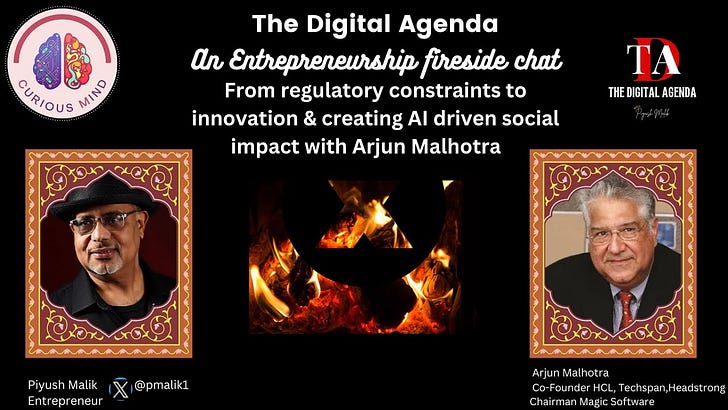
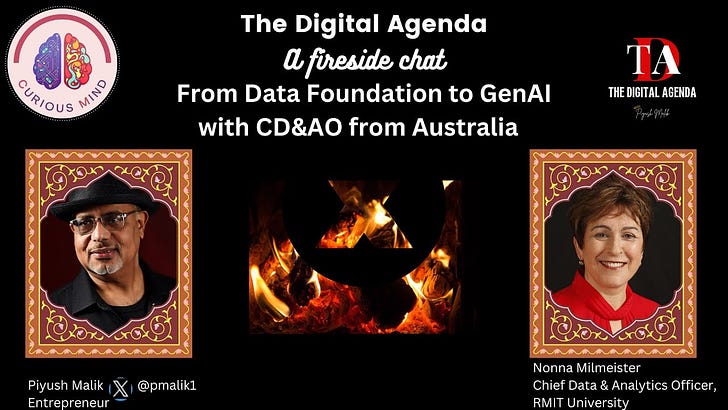
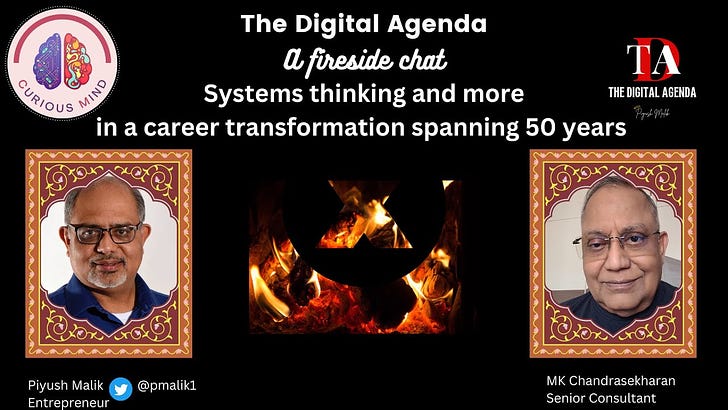
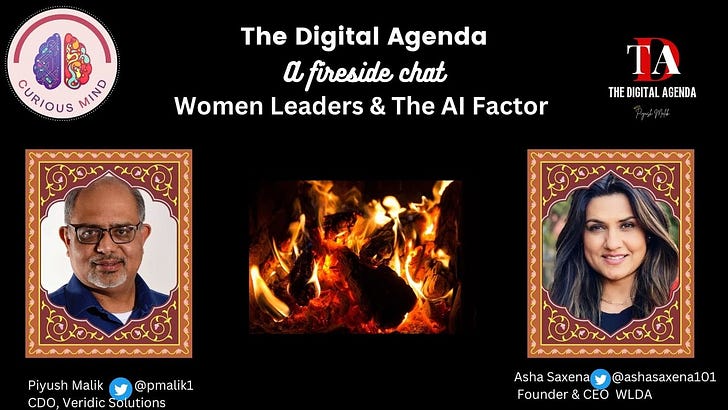
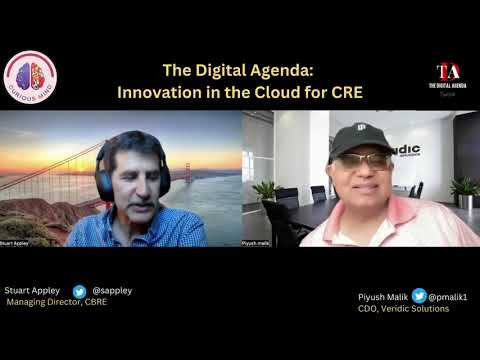
Share this post